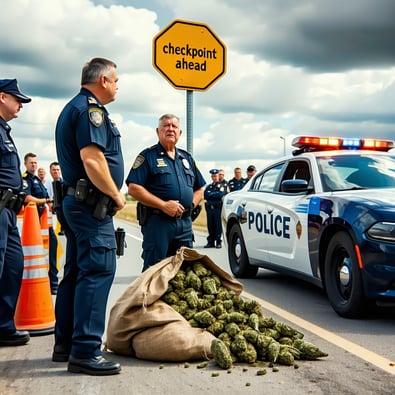The Uneven Reality of Cannabis Arrests in America
The conversation around marijuana reform in the United States continues to evolve, but the latest FBI data paints a troubling picture. Despite the growing legalization movement, cannabis arrests numbers remain alarmingly high in states where marijuana is still prohibited. This data exposes the deep divide between legalization and justice, reminding us that reform is still far from complete.
A Tale of Two Americas
In 2025, cannabis dispensaries operate freely across much of the nation. Yet, in prohibition states, cannabis arrests rates remain the single largest contributor to the war on drugs. In fact, over half of all drug arrests in these states are tied to marijuana. Astonishingly, nine out of ten of these arrests are for possession alone—not manufacturing or trafficking.
This stark reality highlights what some have called “the geography of hypocrisy.” A person can legally purchase cannabis in Illinois but face a cannabis arrests just 20 minutes away in Iowa. The inconsistency is not only illogical but also unjust, perpetuating inequalities that have long plagued marginalized communities.
The Disproportionate Impact
The new data reveals that most cannabis arrests cases occur in low-income neighborhoods and communities of color. These groups have historically borne the heaviest burden of drug-related policing. The social consequences are far-reaching—criminal records, lost jobs, and financial instability—creating cycles of disadvantage that legalization alone has yet to fix.
Policy Pressure Is Building
As more states legalize marijuana, the economic argument becomes impossible to ignore. Prohibition states are spending millions enforcing outdated laws while neighboring states collect millions in tax revenue. Each cannabis arrests represents not only a social injustice but also a lost economic opportunity. Lawmakers are increasingly being asked why resources are still being funneled into enforcement rather than regulation and education.
As long as cannabis remains a Schedule I substance, the system incentivizes law enforcement to continue unnecessary cannabis arrests practices.
Moving Forward
Reform advocates stress that legalization without expungement isn’t true progress. Tens of thousands still carry criminal records for past cannabis arrests charges, even in states where marijuana is now legal. Economic logic and moral reasoning both point toward comprehensive reform that balances profit with fairness.
Until national standards are established, the cannabis arrests disparity will persist. True progress means ensuring that legalization and justice advance together because ending one without addressing the other only deepens the divide.




![[NEW] Stizzy Pro XL](https://420intel.com/hs-fs/hubfs/Screenshot%202024-11-13%20at%208.08.24%20AM.png?width=550&height=395&name=Screenshot%202024-11-13%20at%208.08.24%20AM.png)
